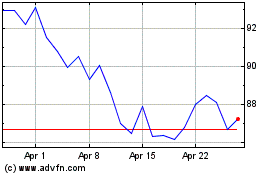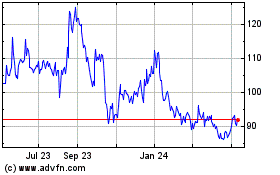Covid-19 Vaccines for Young Children Move Ahead in Testing
June 08 2021 - 12:35PM
Dow Jones News
By Jared S. Hopkins and Peter Loftus
Covid-19 vaccines from Pfizer Inc. and Moderna Inc. are edging
closer to use in young children.
Pfizer and partner BioNTech SE said Tuesday that they have begun
testing their vaccine in children under 12 years old in a pivotal
study. If the results prove positive, Pfizer said it would ask U.S.
health regulators in September to expand use to some of the younger
children.
Meantime, Moderna Chief Executive Stephane Bancel said results
of testing Moderna's vaccine in children as young as five years
could become available by the fall, which if positive could lead to
regulatory authorization of its use in the younger age group.
The Pfizer-BioNTech vaccine is available for children as young
as 12 years, while Moderna's vaccine is authorized for use in
people 18 years and older.
Moderna, of Cambridge, Mass., is seeking regulatory approval for
its use in children 12 to 17 years in some countries but not yet
the U.S., after reporting a positive study in adolescents in May.
The company has said it plans to seek regulatory clearance for
adolescent use in the U.S.
Moderna started a study of its vaccine in children under 12
years in March, and could have results in September or October, Mr.
Bancel said at an event hosted by social-networking app
Clubhouse.
Children are at lower risk of Covid-19 infection than adults,
according to health experts, and when they are infected, they tend
to experience milder symptoms.
Yet some can become seriously ill, and some can spread the
virus. Health authorities are seeking vaccination of children to
protect them and for the development of communitywide, or herd,
immunity that would allow for a return to a more normal life.
"If successful, we believe vaccinating children will help
further protect our communities and contribute to the evolving herd
immunity," said Dr. Bill Gruber, senior vice president of clinical
research and development at Pfizer.
About 6.8 million children 12 years to 17 years have received at
least one dose of a vaccine in the U.S., of whom about 3 million
are fully vaccinated, according to the U.S. Centers for Disease
Control and Prevention.
Pfizer and BioNTech began the early stage, or Phase 1, portion
of their young-children vaccine trial in March.
Pfizer and BioNTech didn't provide any data from the study on
the shot's safety or ability to protect against Covid-19, but said
the results were sufficient to move forward into later-stage, or
Phase 2/3, testing.
Based on the Phase 1 portion of the study, researchers selected
different two-dose regimens for 5 to 11-year-olds and for children
six months to below the age of five, the companies said.
The dosage levels are lower than those for the shots given to
adults and children as young as 12 years old.
The companies said they have already begun enrolling children
who are 5 to 11 years old, and in a few weeks will begin enrolling
children between 6 months and under 5 years.
Altogether, Pfizer plans to enroll up to 4,500 children at more
than 90 locations in the U.S., Finland, Poland and Spain.
Pfizer expects data for children between the ages of 5 and 11 in
September and, if positive, could potentially submit for an
authorization later that month, a company spokesman said.
Data for children from 2 to 5 years could arrive soon after
that, the spokesman said. For children between 6 months and 2
years, data could come in October or November, with an emergency
use authorization to follow, the spokesman said.
Write to Jared S. Hopkins at jared.hopkins@wsj.com and Peter
Loftus at peter.loftus@wsj.com
(END) Dow Jones Newswires
June 08, 2021 12:27 ET (16:27 GMT)
Copyright (c) 2021 Dow Jones & Company, Inc.
BioNTech (NASDAQ:BNTX)
Historical Stock Chart
From Mar 2024 to Apr 2024

BioNTech (NASDAQ:BNTX)
Historical Stock Chart
From Apr 2023 to Apr 2024
